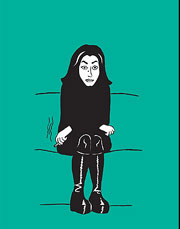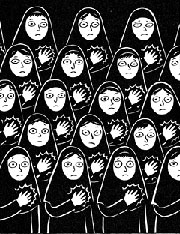|
 President George W. Bush quotes: President George W. Bush quotes:
We're also talking to different finance ministers about how we can send a message to the Iranian government that the free world is not going to tolerate the development of know-how in how to build a weapon, or at least gain the ability to make a weapon.
This notion that the United States is getting ready to attack Iran is simply ridiculous. And having said that, all options are on the table.
Our enemies are innovative and resourceful, and so are we. They never stop thinking about new ways to harm our country and our people, and neither do we.
The real war is not between the West and the East. The real war is between intelligent and stupid people - Marjane Satrapi
The politics of the planet can seem black and white to some people, grey to others, and a massive production of smoke and mirrors to most everyone. After centuries of fighting, mankind still resolves disputes in the 21st century with warfare, conflicts and violence (Iraq, Darfur, Kenya, Virginia Tech, No. Illinois University, etcetera, etcetera). Whenever I watch the news or read the news, I see a world moving towards madness when it should be embracing compassion, understanding and rational thought. And how is there any hope for peaceful resolutions when officials of my own government have their heads so far up their asses? My blood boils when I watch members of the House Committee on Oversight and Government Reform grill Roger Clemens about steroid use. Why is Congress worried about the supposed integrity of baseball, a lucrative form of entertainment, and not dissecting every aspect of the war (and corruption) in Iraq, US foreign policy in general, the accessibility of acquiring guns, and the outrageous amounts of money being spent on presidential campaigns? Where are the contemporary voices of reason?
And then I think of one... Marjane Satrapi!
You may already know about her, but I was ignorant of her talent until a few months ago.
If you are familiar with Art Spiegelman’s Pulitzer-Prize winning graphic novel Maus, (which recounts his family's experience during and after the Holocaust), then Marjane Satrapi is his art movement's progeny.  She has a body of work full of sadness, humor and grace and she is an artist who sheds light and humanity to Iran, a place and culture that too many Westerners do not understand. Satrapi, who was born in Rasht, Iran and grew up in Tehran and Vienna, Austria, is a French/Iranian graphic novelist and illustrator and her most notable work is an award-winning series of autobiographical graphic novels called Persepolis. Now Persepolis is an animated feature film, nominated for an Academy Award and numerous international awards as well as a winner at Cannes Film Festival, British Film Institute Awards and Vancouver International Film Festival to name a few. She has a body of work full of sadness, humor and grace and she is an artist who sheds light and humanity to Iran, a place and culture that too many Westerners do not understand. Satrapi, who was born in Rasht, Iran and grew up in Tehran and Vienna, Austria, is a French/Iranian graphic novelist and illustrator and her most notable work is an award-winning series of autobiographical graphic novels called Persepolis. Now Persepolis is an animated feature film, nominated for an Academy Award and numerous international awards as well as a winner at Cannes Film Festival, British Film Institute Awards and Vancouver International Film Festival to name a few.
Simply drawn in black and white, Satrapi's ideas are anything but. Persepolis revolves around Satrapi's young alter ego, Marji, as she comes of age during the Iranian Revolution which transferred power of the country from a monarchy to an Islamic Republic, the war between Iran and Iraq (1980-1988) and the repression of political freedom, religious minorities, and women.
Satrapi fluidly captures the love and intelligence of her family, the darkness and hypocrisy of the regimes, the devastation of war, and the enduring human spirit of her people. And for those beings who don't know much about the conflicts in her country and the Middle East, her drawings and words paint and describe a place and time in history in an uncomplicated manner. And her view is remarkably clear and objective, even though it is filtered through her own personal experience.
Here is Marjane Satrapi in her own words.
Why I Wrote Persepolis - From the time I came to France in 1994, I was always telling stories about life in Iran to my friends.  We'd see pieces about Iran on television, but they didn't represent my experience at all. I had to keep saying, "No, it's not like that there." I've been justifying why it isn't negative to be Iranian for almost twenty years. How strange when it isn't something I did or chose to be? After I finished university, there were nine of us, all artists and friends, working in a studio together. That group finally said, "Do something with your stories." They introduced me to graphic novelists. Spiegelman was first. And when I read him, I thought "Jesus Christ, it's possible to tell a story and make a point this way." We'd see pieces about Iran on television, but they didn't represent my experience at all. I had to keep saying, "No, it's not like that there." I've been justifying why it isn't negative to be Iranian for almost twenty years. How strange when it isn't something I did or chose to be? After I finished university, there were nine of us, all artists and friends, working in a studio together. That group finally said, "Do something with your stories." They introduced me to graphic novelists. Spiegelman was first. And when I read him, I thought "Jesus Christ, it's possible to tell a story and make a point this way."
It was amazing.
Writing a Graphic Novel is Like Making a Movie - People always ask me, "Why didn't you write a book?" But that's what Persepolis is. To me, a book is pages related to something that has a cover.  Graphic novels are not traditional literature, but that does not mean they are second-rate. Images are a way of writing. When you have the talent to be able to write and to draw it seems a shame to choose one. I think it's better to do both. We learn about the world through images all the time. In the cinema we do it, but to make a film you need sponsors and money and 10,000 people to work with you. With a graphic novel, all you need is yourself and your editor. Of course, you have to have a very visual vision of the world. You have to perceive life with images otherwise it doesn't work. Some artists are more into sound; they make music. The point is that you have to know what you want to say, and find the best way of saying it. It's hard to say how Persepolis evolved once I started writing. I had to learn how to write it as a graphic novel by doing. Graphic novels are not traditional literature, but that does not mean they are second-rate. Images are a way of writing. When you have the talent to be able to write and to draw it seems a shame to choose one. I think it's better to do both. We learn about the world through images all the time. In the cinema we do it, but to make a film you need sponsors and money and 10,000 people to work with you. With a graphic novel, all you need is yourself and your editor. Of course, you have to have a very visual vision of the world. You have to perceive life with images otherwise it doesn't work. Some artists are more into sound; they make music. The point is that you have to know what you want to say, and find the best way of saying it. It's hard to say how Persepolis evolved once I started writing. I had to learn how to write it as a graphic novel by doing.
What I Wanted to Say - I'm a pacifist. I believe there are ways to solve the world's problems. Instead of putting all this money to create arms, I think countries should invest in scholarships for kids to study abroad. Perhaps they could become good and knowledgeable professors in their own countries. You need time for that kind of change though. I have been brought up open-minded. If I didn't know any people from other countries, I'd think everyone was evil based on news stories.  But I know a lot of people, and know that there is no such thing as stark good and evil. Isn't it possible there is the same amount of evil everywhere? If people are given the chance to experience life in more than one country, they will hate a little less. It's not a miracle potion, but little by little you can solve problems in the basement of a country, not on the surface. That is why I wanted people in other countries to read Persepolis, to see that I grew up just like other children. It's so rewarding to see people at my book signings who never read graphic novels. They say that when they read mine they became more interested. If it opens these people's eyes not to believe what they hear, I feel successful. But I know a lot of people, and know that there is no such thing as stark good and evil. Isn't it possible there is the same amount of evil everywhere? If people are given the chance to experience life in more than one country, they will hate a little less. It's not a miracle potion, but little by little you can solve problems in the basement of a country, not on the surface. That is why I wanted people in other countries to read Persepolis, to see that I grew up just like other children. It's so rewarding to see people at my book signings who never read graphic novels. They say that when they read mine they became more interested. If it opens these people's eyes not to believe what they hear, I feel successful.
You Have to Think Freely to Know What to Write - My parents were very proud when they read Persepolis.  If I criticize them once in a while, it's because it's the truth, and they laugh. My father always says, "It is only an idiot who never changes his mind." My parents accept that times change, and they are not right anymore. They've taught me that you can make mistakes. They were extremely open-minded about what I said and they were demanding. I'm also tender with them because they were magnificent parents. They gave me the most important thing -- the freedom of thinking and deciding for myself. The best present anyone can receive is not being formatted because the world or a religion wants you to be. If I criticize them once in a while, it's because it's the truth, and they laugh. My father always says, "It is only an idiot who never changes his mind." My parents accept that times change, and they are not right anymore. They've taught me that you can make mistakes. They were extremely open-minded about what I said and they were demanding. I'm also tender with them because they were magnificent parents. They gave me the most important thing -- the freedom of thinking and deciding for myself. The best present anyone can receive is not being formatted because the world or a religion wants you to be.
Excerpts and graphics from the Pantheon edition of Persepolis
|
